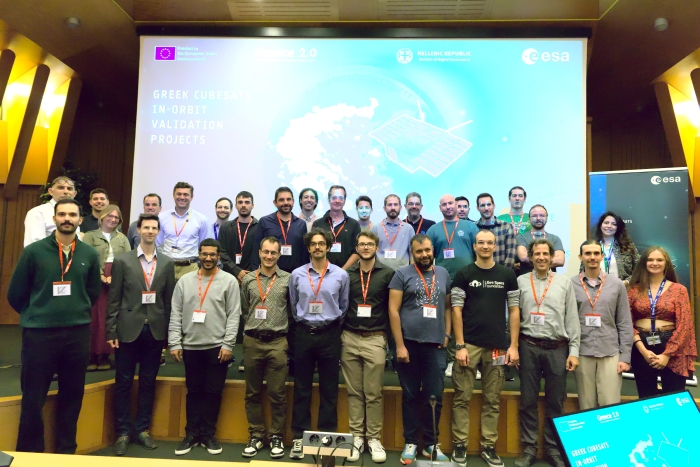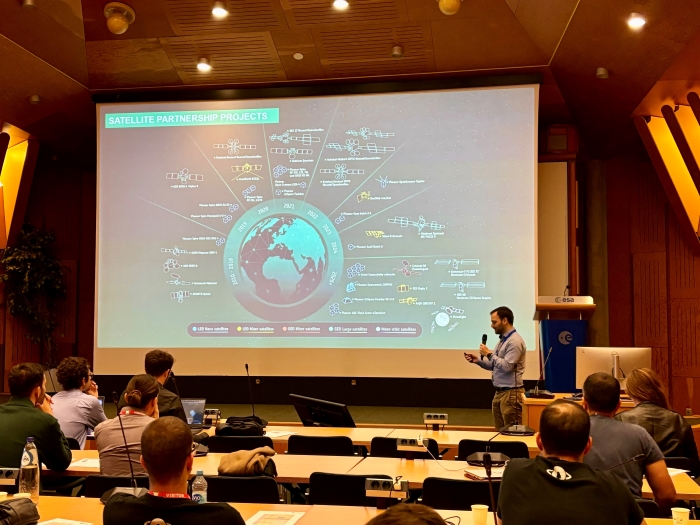European Space Agency works with Greek Ministry of Digital Governance for secure and resilient connectivity

ESA is working to ensure that its Member States have access to secure and resilient connectivity, on a national and European level. Working with the Greek Ministry of Digital Governance, the agency has backed seven Greek CubeSat missions, developed by small and medium-sized companies and universities, since June 2023. The Greek national programme brings together Greek scientists, engineers and industrial players, to showcase Greece’s place as a key European and global space nation.
These projects bring together Greece’s growing national capabilities, boosting their presence in the space sector. Since the announcement of the programme a little over a year ago, the projects are now nearing completion of the critical design phase and will progress to assembly and integration. The CubeSats will then undergo rigorous testing to prepare for launch in 2025.
The seven missions will deliver a range of services essential for modern space applications, including Earth observation, secure communications, and maritime tracking:
- Phasma: Developed by the Libre Space Foundation, this mission involves two 3U CubeSats focused on radio frequency signal detection and monitoring for enhanced space situational awareness.
- OptiSat: A 6U CubeSat designed by Planetek Hellas for secure optical communication and space-based data processing. This mission includes capabilities for automated cloud coverage assessment, supporting Earth observation and communication needs.
- PeakSat: Led by the Aristotle University of Thessaloniki, this 3U CubeSat will demonstrate laser-optical communication links with ground stations in Greece, advancing technologies for high-speed data transmission.
- MICE-1: Prisma Electronics SA is developing this 3U CubeSat to enhance maritime tracking in the Mediterranean Sea through the reception of Automatic Identification System (AIS) signals and Internet of Things (IoT) communication.
- DUTHSat-2: A 6U CubeSat from the Democritus University of Thrace, designed to capture visible and near-infrared imagery for applications such as oil spill detection and soil moisture monitoring.
- ERMIS: This mission consists of a constellation of three CubeSats (two 6U and one 8U), developed by National and Kapodistrian University of Athens, to support IoT applications, inter-satellite communications, hyperspectral imaging for precision agriculture, and optical communications.
- Hellenic Space Dawn: Led by EM Tech, this project involves two 8U CubeSats, Helios and Selene, focused on the validation of in-space data processing hardware, Earth observation and demonstrating secure optical communications and inter-satellite links.
These missions enhance Greece’s technological expertise and leadership, demonstrating the broad capabilities that space-enabled technologies bring to the Greek and wider European economy. As part of the nation’s EU-funded Recovery and Resilience Facility, the programme is driving Greece’s digital transformation while fostering job creation and promoting economic prosperity.

The CubeSat projects form the first part of ESA’s Greek Connectivity Programme, which will see the utilisation of Greek satellites for secure connectivity, as well as the establishment of a state-of-the-art national assembly integration and testing facility, and upgrading existing national optical ground and radio-frequency tracking stations.
To support the projects for the upcoming stages, ESA organised a workshop in August 2024 for more than 30 participants at ESA's European Space Research and Technology Centre (ESTEC) in The Netherlands, ESTEC. This two-day workshop further developed the participants’ understanding and knowledge of the assembly, integration and testing of the CubeSats, with ESA experts sharing their experiences from previous projects.
This collaborative knowledge exchange workshop covered topics ranging from CubeSat environmental testing to quality assurance, topics critical to the next stages of the programme. Drawing on real-world case studies and methodologies and processes from best practices, participants were able to take these strategies back to their projects for implementation ahead of the scheduled launch date. Additionally, the tour of ESTEC’s Mechanical System Laboratory gave a first-hand look at the state-of-the-art testing and integration infrastructure, enhancing Greek capabilities and knowledge ahead of the development of their national facilities.
"These CubeSat projects exemplify the innovative spirit and technical strength of Greece's space sector. ESA is proud to support this journey, which will not only benefit Greece but also contribute significantly to Europe's space capabilities,” said Frederic Rouesnel, Greek National RRF Project Manager for the Greek CubeSat missions.
“The Greek CubeSat In-Orbit Validation (IOV) programme focuses on augmenting the technical competence of Greek space industry and academia on designing, building, launching, and operating end-to-end satellite systems. The primary focus of the programme is on secure connectivity applications (Optical and RF), while Earth observation applications are also within scope. This underlines the wide reach of the activity to the Greek space ecosystem, thus enhancing the interdisciplinary expertise of Greek engineers in space applications and technologies,” said Dimitrios Christopoulos, Scientific officer in satellite communications and integrated applications of the Hellenic Space Center, responsible for supervising the Greek IoV implementation and safekeeping its alignment to the national needs on behalf of the Ministry of Digital Governance.
In March 2019, ESA and the Greek Ministry of Digital Governance launched the Greek National Satellite Space Project as part of the Greek Connectivity Programme under Regulation (EU) 2021/241 and aligned with Greece’s Recovery Plan, approved on 6 July 2021. This initiative aims to enhance Greece’s satellite capabilities. It focuses on developing, producing, and launching versatile small satellites for secure connectivity and multiple services, leveraging Greece’s advanced observatories for high-speed optical and quantum communications.


